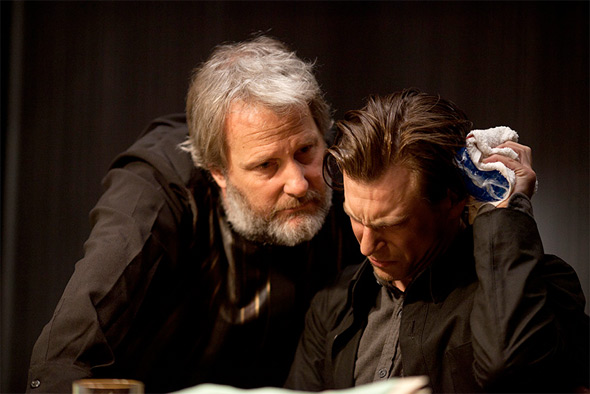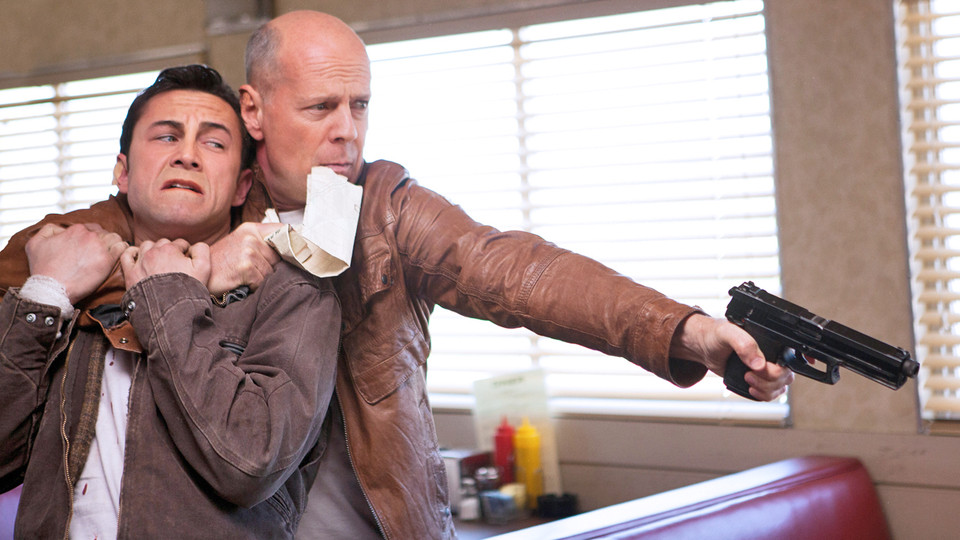|
In the
future criminal organisations have access to time travel, which has
been made
illegal by the government. Since people are easily tracked, criminals
have had
to think of new ways to dispose of bodies. They use time travel to send
back
people they want killed and to have their bodies disposed. The people
hired to
kill them are called Loopers. If a Looper misses their target they will
have
only thirty years to live their life before they are killed. One of
these
Loopers is Joe (Joseph Gordon-Levitt), who was taken away from petty
crime and
given a job by his boss Abe (Jeff Daniels). One day Joe is shocked to
see that
the person sent back to him is an older version of himself (Bruce
Willis). Old
Joe manages to escape but then later explains that in the future his
wife is
killed by the crime boss the Rainmaker. He vows that he is going to
track down
the Rainmaker as a child named Cid. The younger Joe discovers that Cid
is being
sheltered by his mother Sara (Emily Blunt) on a farm and that the boy
has
special powers.

Hollywood
is afraid that we won't "get it". If a film is deemed too confusing,
or too ambiguous, it is a failure amongst audiences. The safety net for
Hollywood is therefore to reproduce previous successes, through sequels
and
remakes, because they're already proven with audiences and therefore bankable. It saves Hollywood from the
potential embarrassment of funding something that is too risky. This
ridiculously naive attitude to mainstream audiences, not only denies
them the
opportunity to think for themselves and to be tested against new
concepts, but
also restricts filmmakers from providing something truly unique.
Established
filmmakers, those who are profitable at the box-office, are granted
more
creative freedom and control, which means that their work can remain
intact.
Christopher Nolan's Inception (2010)
and Duncan Jones's Source Code
(2011), for example, escaped from the net of the studio system and were
rightly
labelled as the 'thinking man's blockbuster'. Looper
has similar ambitions. It is written and directed by Rian
Johnson, who made the post-modern noir drama Brick
(2005). Johnson says he idolises the Coen brothers and isn't
interested in studio projects. Although his film is overflowing with
interesting ideas, both old and new, and you can admire it alone for
that,
there are conventional elements at play that don't allow the film to
free
itself from the imprint of the modern studio system. It's tense, funny
and
action-packed, but it could have been better.

After
such an engaging and original opening scene, it's difficult not to be
disappointed by much of what follows afterwards. It's a fantastic start
because
it catches you off guard with something entirely unexpected, providing
a
wonderful platform for mystery. Why then does Johnson impatiently
diminish these
feelings of shock and disorientation by explaining exactly what just
happened
and why through voice over? Were
there scenes cut explaining these crucial plot
points more organically? Some of the exposition
is admittedly useful later in the film, as the shape of the
narrative
becomes tricky, but this opening is just downright lazy. It is also
unusual
that as original as the film's premise sounds, the creativity doesn't
flow
through to the character of Joe. Aside from his unique line of work, he
is not
a particularly interesting or unique character. His reliance on fast
cars and
women, as well as his decision to sell out a friend, means that there
is a
conventional track of progression to follow here. He shifts from
heartless
killing machine, to surprise, an unselfish nice guy, protector of woman
and
child and potential love interest. Who would have thought?
Comparatively, Old
Joe's narrative is at its simplest a tragic love story, which is
detached and
uninvolving. This brief subplot with Joe and his future wife is
presented through
montage, reflecting faded memories (a clever stylistic touch). But it
also
means that not a lot of time is spent developing their relationship, so
a
significant plot point is more like a minor footnote. It reminded me a
lot of
Cobb and Mal's relationship in Inception,
but that was developed over the course of the entire film, with great
dramatic
results.

As
conventional as some of the character development is, there are finer
details
in the screenplay that are small but intriguing, building up to a
bigger
picture of the film's universe. One of the more fascinating aspects is
how
impoverished the streets are in the future, which means that scavenging
is a
necessity for the lower class and those who have guns will use them.
The way
the film scans through some of these images of poverty, weapons and
violence is
occasionally more brutal and confronting than you might expect. That is
until
the last quarter where the film itself relies on these gunfights
itself, opting
to have Bruce Willis dual wield twin machine guns and wipe out rooms
full of
bad guys. The point being that as the film becomes increasingly
straight
forward, with its structural gimmicks and dark themes unravelled, the
more it
lulls. There is definitely a large dip in the amount of energy in the
second
half, with a lot of time spent on Sara's farm. It is here that the film
also
feels strangely derivative of the Terminator
films, as two men from different time periods have the conflicting
roles of
shaping a child's future history. For many of Looper's
flaws though, it is still a film of ideas. Some of
them contribute to a slickly produced sci-fi story
and others merely try to hide the more conventional elements of the
script.
There is little doubt that it's far more sophisticated and ambitious
than the
recent Total Recall (2012), but it's
also a few steps well short
of the craft and the emotional hook of Inception.
|